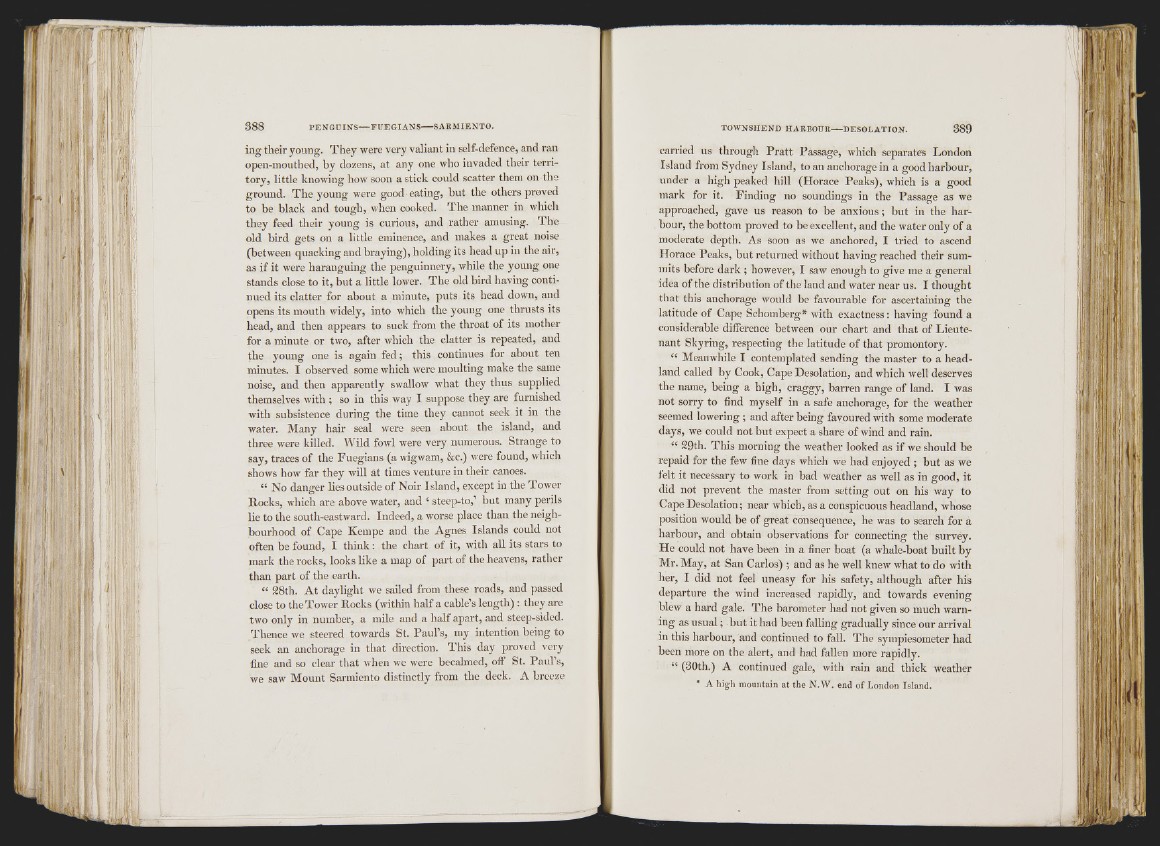
ing tlieir young. They were very valiant in self-defence, and ran
open-mouthed, by dozens, at any one who invaded their territory,
little knowing how soon a stick could scatter them on the
ground. The young were good-eating, but the others proved
to be black and tough, when cooked. The manner in which
they feed their young is curious, and rather amusing. The
old bird gets on a little eminence, and makes a great noise
(between quacking and braying), holding its head up in the air,
as if it were haranguing the penguinnery, while the young one
stands close to it, but a little lower. The old bird having continued
its clatter for about a minute, puts its head down, and
opens its mouth widely, into which the young one thrusts its
head, and then appears to suck from the throat of its mother
for a minute or two, after which the clatter is repeated, aud
the young one is again fed; this continues for about ten
minutes. I observed some which were moulting make the same
noise, and then apparently swallow what they thus supplied
themselves with ; so in this way I suppose they are furnished
with subsistence during the time they cannot seek it in the
water. Many hair seal were seen about the island, and
three were killed. Wild fowl were very numerous. Strange to
say, traces of the Fuegians (a wigwam, &c.) were found, which
shows how far they will at times venture in their canoes.
“ No danger lies outside of Noir Island, except in the Tower
Rocks, which are above water, and ‘ steep-to,’ but many perils
lie to the south-eastward. Indeed, a worse place than the neighbourhood
of Cape Kempe and the Agnes Islands could not
often be found, I think; the chart of it, with all its stars to
mark the rocks, looks like a map of part of the heavens, rather
than part of the earth.
“ 28th. At daylight we sailed from these roads, and passed
close to the Tower Rocks (within half a cable’s length) : they are
two only in number, a mile and a half apart, and steep-sided.
Thence we steered towards St. Paul’s, my intention being to
seek an anchorage in that direction. This day proved very
fine and so clear that when we were becalmed, oif St. Paul’s,
we saw Mount Sarmiento distinctly from the deck. A breeze
carried us through Pratt Passage, which separates London
Island from Sydney Island, to an ancliorage in a good harbour,
under a high peaked hill (Horace Peaks), which is a good
mark for it. Finding no soundings in the Passage as we
approached, gave us reason to be anxious; but in the harbour,
the bottom proved to be excellent, and the water only of a
moderate depth. As soon as we anchored, I tried to ascend
Horace Peaks, but returned without having reached their summits
before dark ; however, I saw enough to give me a general
idea of the distribution of the land and water near us. I thought
that this anchorage would be favourable for ascertaining the
latitude of Cape Schomherg* with exactness: having found a
considerable difference between our chart and that of Lieutenant
Skyring, respecting the latitude of that promontory.
“ Meanwhile I contemplated sending the master to a headland
called by Cook, Cape Desolation, and which well deserves
the name, being a high, craggy, barren range of land. I was
not sorry to find myself in a safe anchorage, for the weather
seemed lowering ; and after being favoured with some moderate
days, we could not hut expect a share of wind and rain.
“ 29th. This morning the weather looked as if we should be
repaid for the few fine days which we had enjoyed ; but as we
felt it necessary to work in bad weather as well as in good, it
did not prevent the master from setting out on his way to
Cape Desolation; near which, as a conspicuous headland, whose
position would be of great consequence, he was to search for a
harbour, and obtain observations for connecting the survey.
He could not have been in a finer boat (a whale-boat built by
Mr. May, at San Carlos) ; and as he well knew what to do with
her, I did not feel uneasy for his safety, although after his
departure the wind increased rapidly, and towards evening
blew a hard gale. The barometer had not given so much warning
as usual; but it had been falling gradually since our arrival
in this harbour, and continued to fall. The sympiesometer had
been more on the alert, and had fallen more rapidly.
“ (30th.) A continued gale, with rain and thick weather
• A high mountain at the N .W . end of London Island.
l l
' I
,»i
I